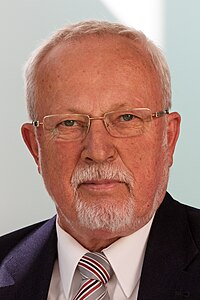Blaine Blaisworth: Difference between revisions
No edit summary |
mNo edit summary |
||
| Line 106: | Line 106: | ||
==Life after politics== | ==Life after politics== | ||
{{DEFAULTSORT:Blaisworth, Blaine}} | |||
[[Category:Scalizagasti]] | [[Category:Scalizagasti]] | ||
[[Category:Prime Ministers of Scalizagasti]] | [[Category:Prime Ministers of Scalizagasti]] | ||
Revision as of 02:12, 10 August 2021
This article is incomplete because it is pending further input from participants, or it is a work-in-progress by one author. Please comment on this article's talk page to share your input, comments and questions. Note: To contribute to this article, you may need to seek help from the author(s) of this page. |
The Right Honourable Blaine Blaisworth | |
|---|---|
 | |
| Prime Minister of Scalizagasti | |
| In office 25 February 2003 – 4 November 2004 | |
| President | Jennifer Charest |
| Preceded by | Russel Balfour |
| Succeeded by | Menosia Etterson (interim) |
| Leader of the Official Opposition | |
| In office 2 June 2000 – 25 February 2003 | |
| Prime Minister | Russel Balfour |
| Preceded by | Friedrich Zia |
| Succeeded by | Russel Balfour |
| Leader of the Social Democratic Party | |
| In office 2 June 2000 – 4 November 2004 | |
| Preceded by | Friedrich Zia |
| Succeeded by | Menosia Etterson (interim) |
| Member of Parliament | |
| In office 3 August 2001 – 4 November 2004 | |
| Constituency | Sunshine Coast |
| Governor of Palyria | |
| In office 1983–1998 | |
| Personal details | |
| Born | Blaine Piers Blaisworth 10 March 1944 Mount Royal, Palyria, Scalizagasti |
| Political party | Social Democratic Party (Since 1961) |
| Children | 3 |
| Alma mater | Alesting University |
Blaine Piers Blaisworth (born 10 March 1944) is a retired Scalizagastian politician who served as Prime Minister of Scalizagasti from 2003 to 2004 and Leader of the Opposition from 2000 to 2003. He was the leader of the Social Democratic Party of Scalizagasti from 2000 to 2004, retiring due to a corruption scandal prior to his party's defeat in the 2004 election. He was elected as a Member of Parliament for Palyria in 2001 election until his resignation as a Member of Parliament. He was also the Governor of Palyria from 1983 to 1998, running under the SDP banner.
Early life and education
Palyrian SDP
1983 Provincial Election
Governor of Palyria
First term (1983-87)
Second term (1987-91)

Third term (1991-93)
Fourth term (1993-97)
Liberal economic reforms
During the 1993 election, Blaisworth adopted a more liberal platform to compete with the growing centre-right opposition. During his fourth term, Blaisworth enacted numerous reforms to the provincial welfare, most notably the Bardoch Program. The Bardoch Program reduced spending on unemployment benefits while requiring all recipients to actively search for employment; those who willingly refused employment opportunities would have their benefits cut. The provincial corporate tax rate was reduced from 14% to 12%, although the lost revenues were offset by an increase in the income tax for top earners. In addition, the government invested in skill-training programs to improve the employability of those searching for work.
Progressive Labour Caucus revolt
In April 1995, left-wing members of the Palyrian SDP left the party in protest of Blaisworth's economic policies. The leader of the revolt, Angela Dian-Norler criticized what she described as "neoliberalism to the extreme" which would dismantle the provincial welfare programs built up over the last half-decade. The renegade parliamentarians formed the Progressive Labour Caucus, planning to contest the upcoming provincial and federal elections in 1997. To avoid confusion with the federal Labour and Socialist Party, ran under the Palyrian Left banner. While the party struggled in the 1997 provincial election against the popular SDP, it did rather well in the federal election where it outperformed the SDP in three out of four Palyrian ridings.
Fifth term and resignation (1997-98)
Becoming federal SDP leader
Leader of the Opposition
Prime Minister
First term (February–October 2003)
In January 2003, the Progressive People's Party withdrew from the RRP's coalition government over ideological disagreements. On 6 February, a vote of non-confidence was sponsored by the SDP, which passed 264-222. Both Blaisworth and Prime Minister Balfour began negotiations with the other parties, and on 25 February the SDP announced it had enough support to form the next government. A coalition between the SDP, Labour, PPP, and Moderate Democrats had 184 seats, one more than the RRP's 183. The LCA agreed to abstain on the initial investiture vote, allowing it to pass 196-195.
In May 2003, the government introduced an aviation tax on all flights in Scalizagasti. International flights would have a 7% tax applied to them, while domestic flights would have a 2.5% tax. This would be the only policy of significance to be passed during Blaisworth's first term.
Due to the ideological diversity of the government, it was very fragile and quickly collapsed. As a minority government, all legislation required the approval of the LCA which generally did not support the government's centre-left policies. Furthermore, there were ideological disagreement between the socialist Labour Party and the liberal Moderate Democrats over public spending and welfare. This culminated in the September budget failing 173-309, with even government Labour members shooting down the budget. Following the failure of the budget, President Jennifer Charest called for an early election.
